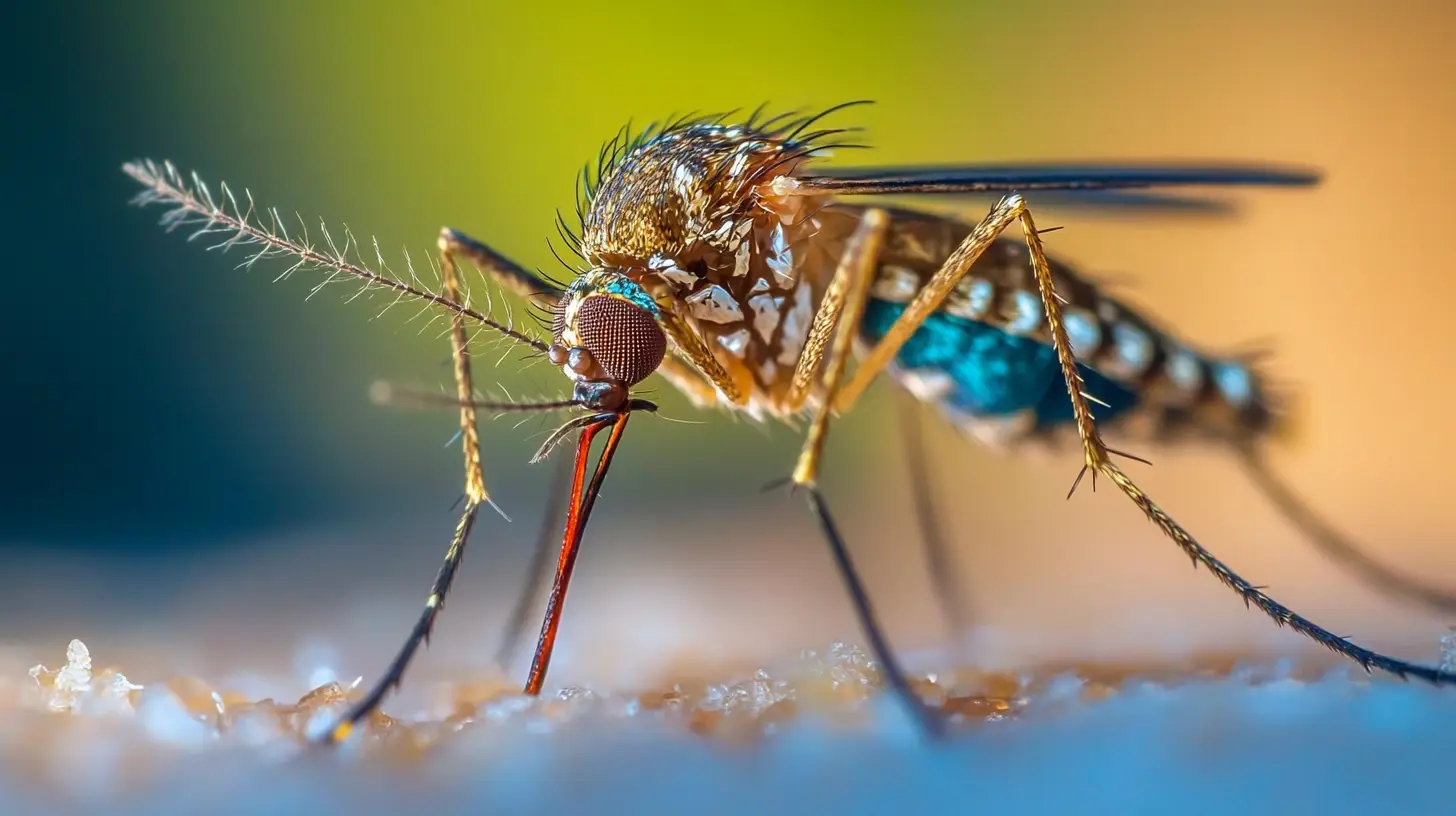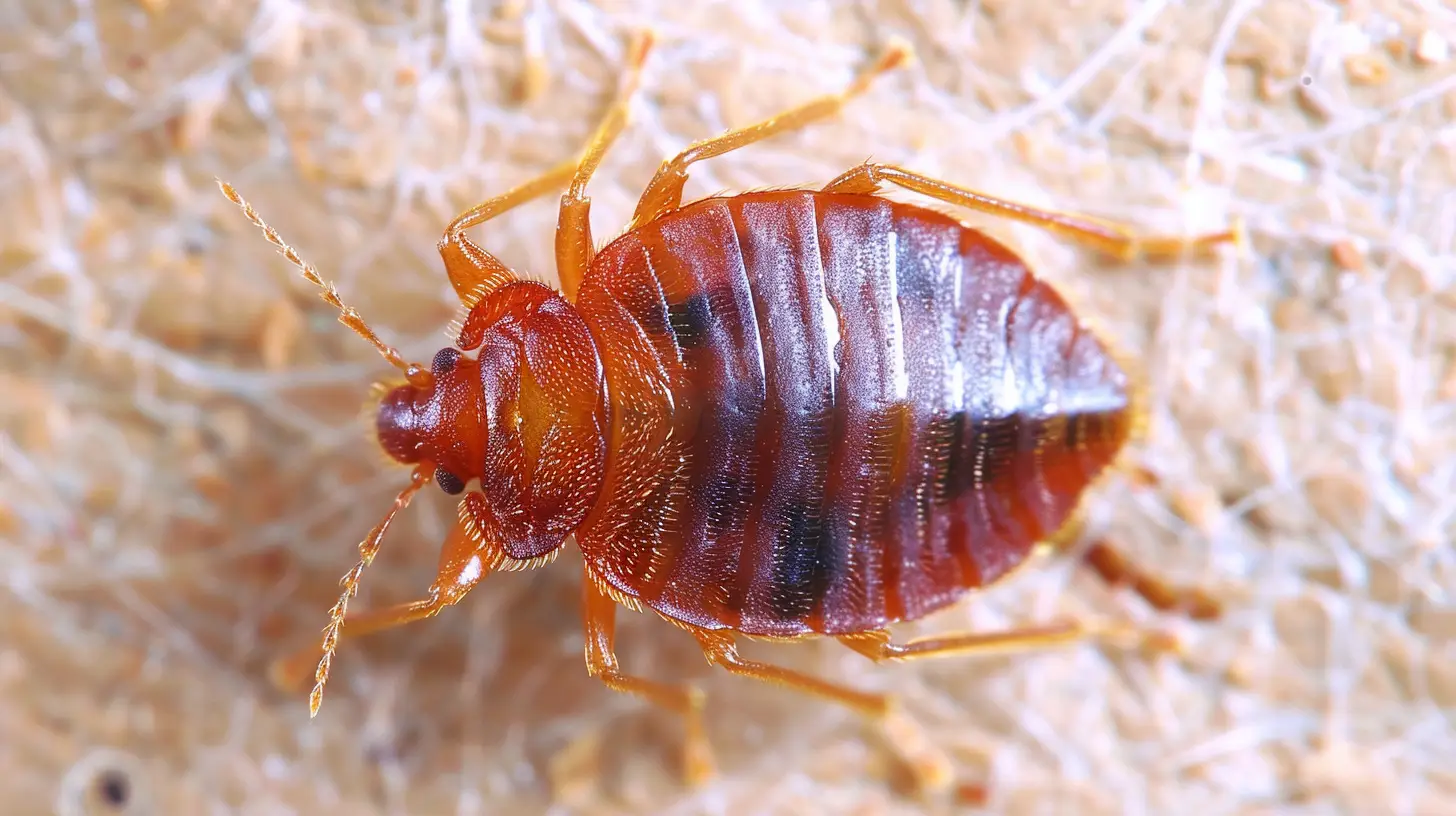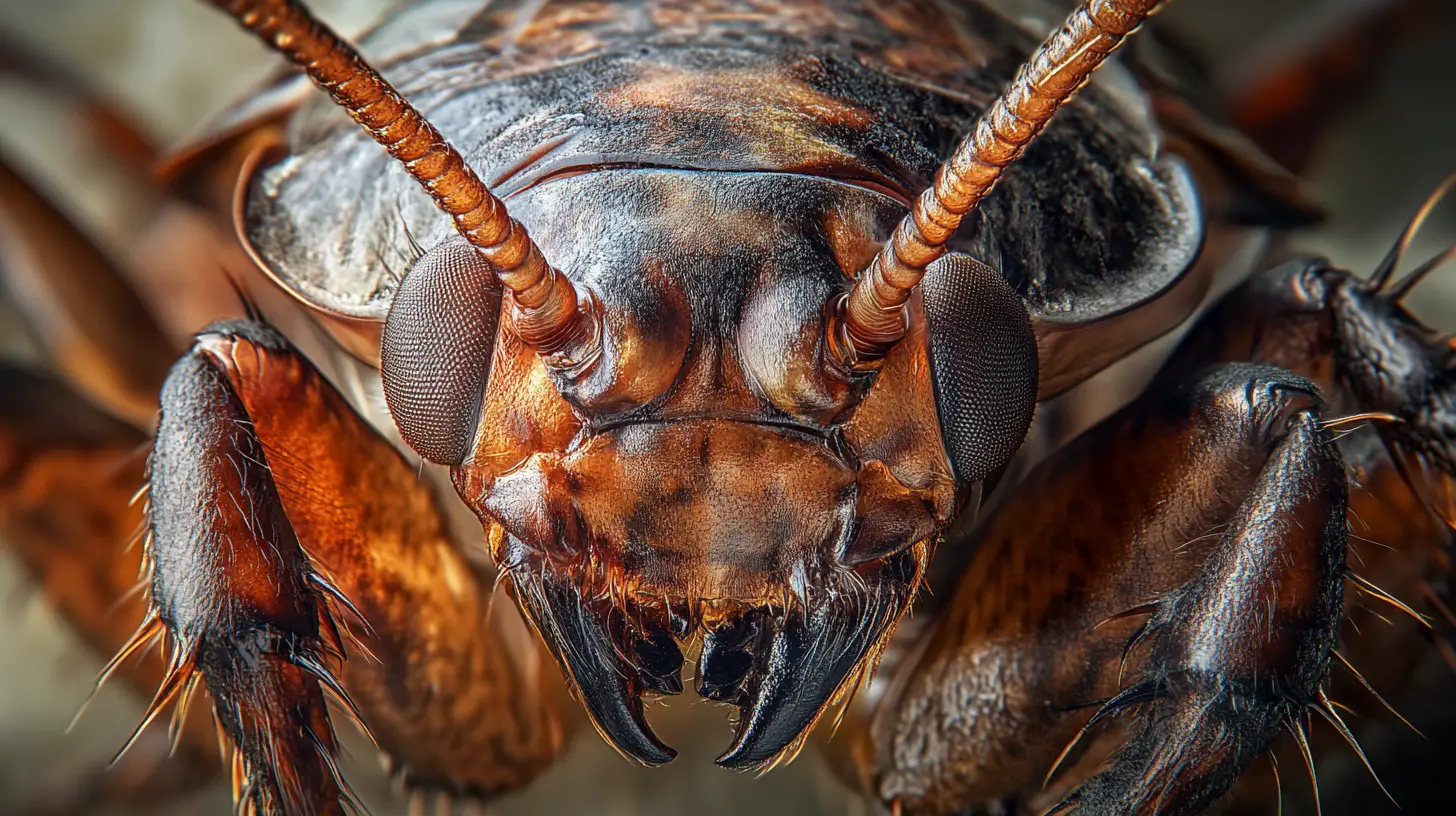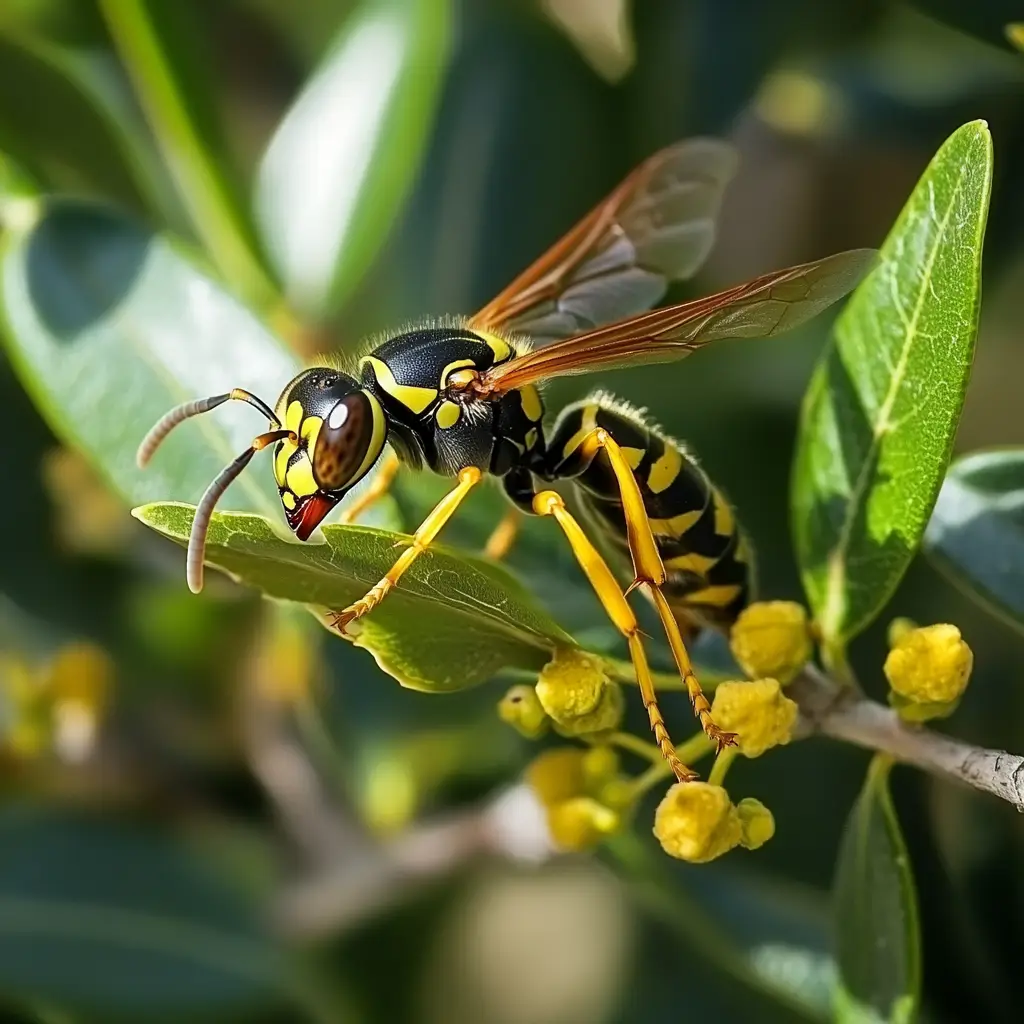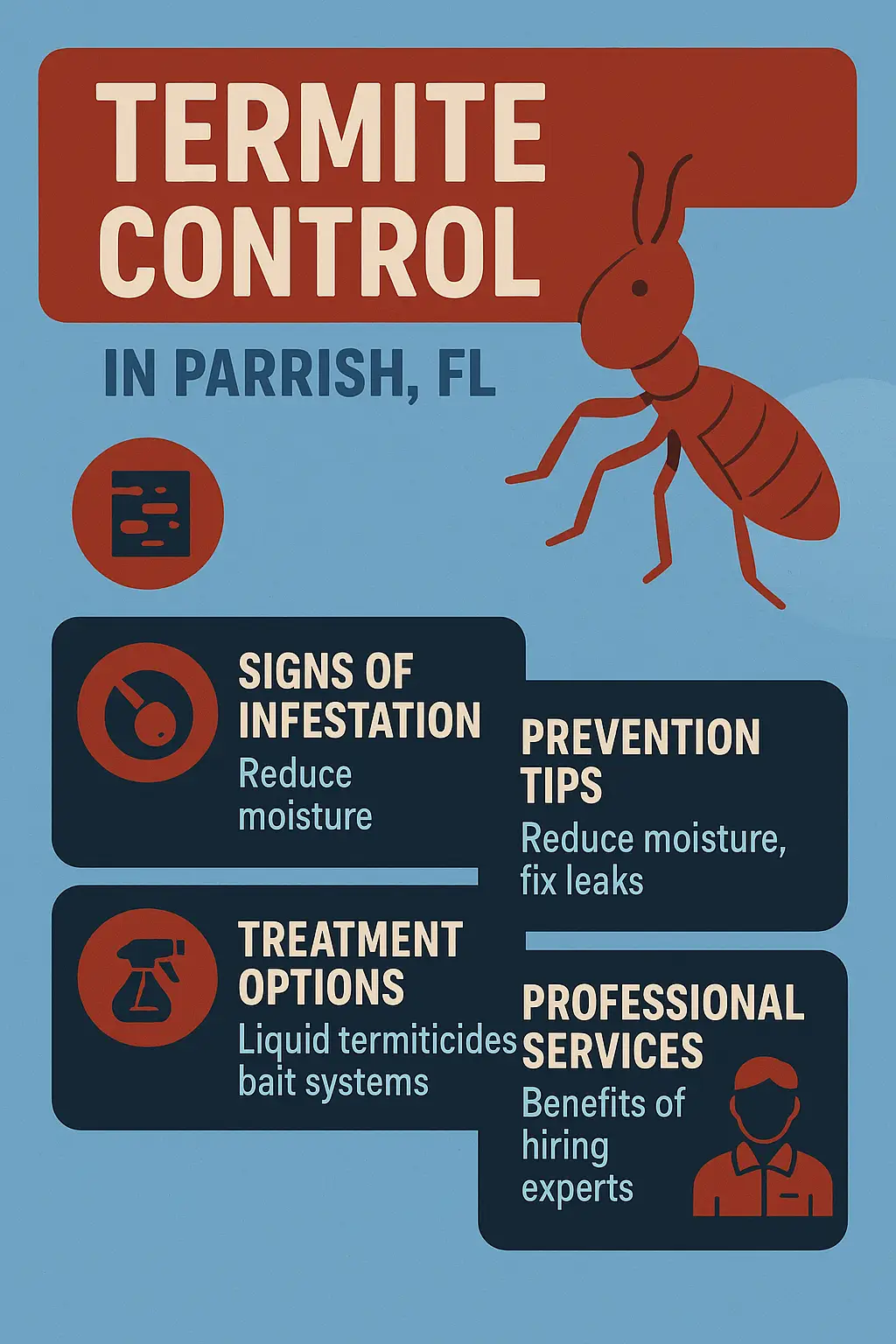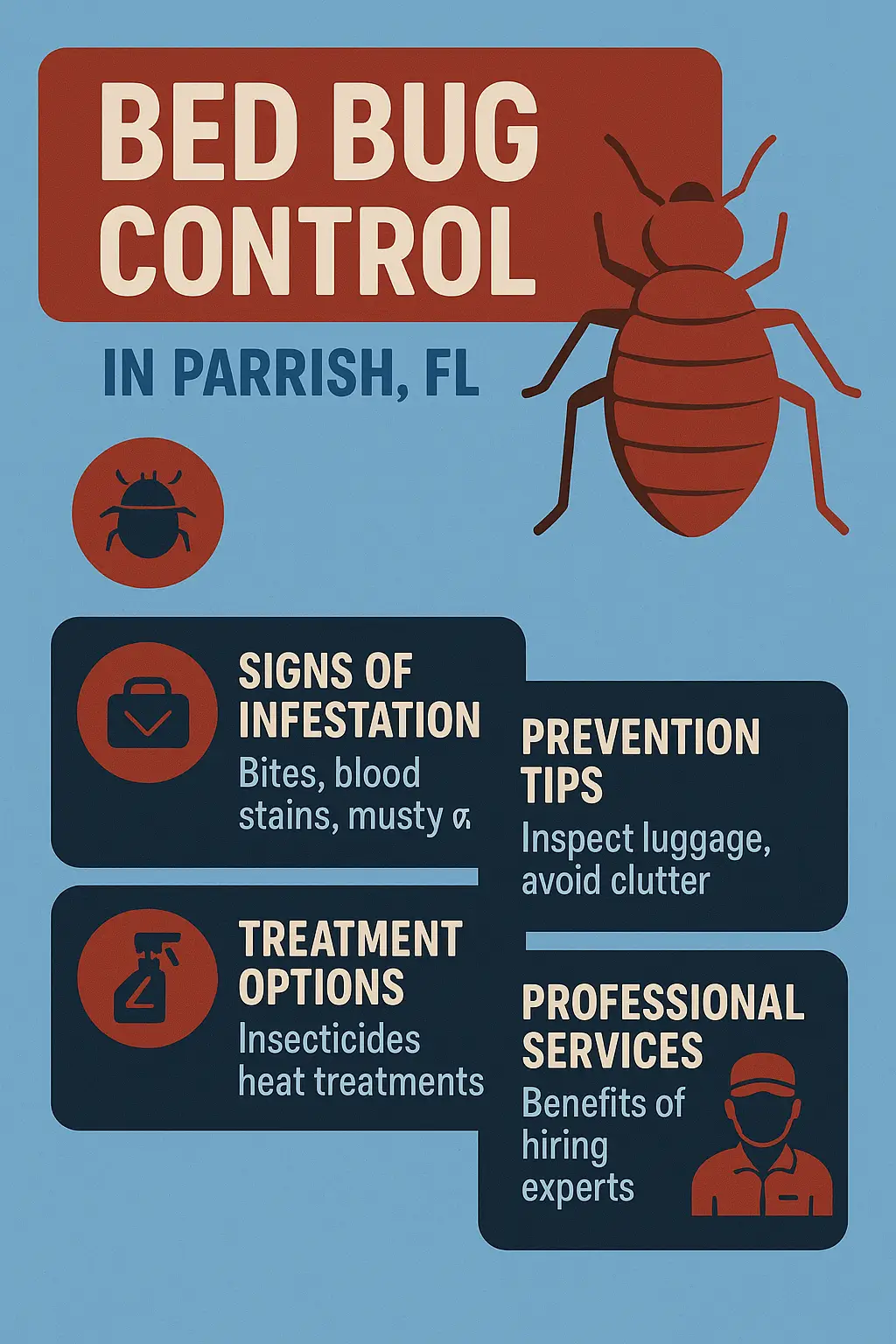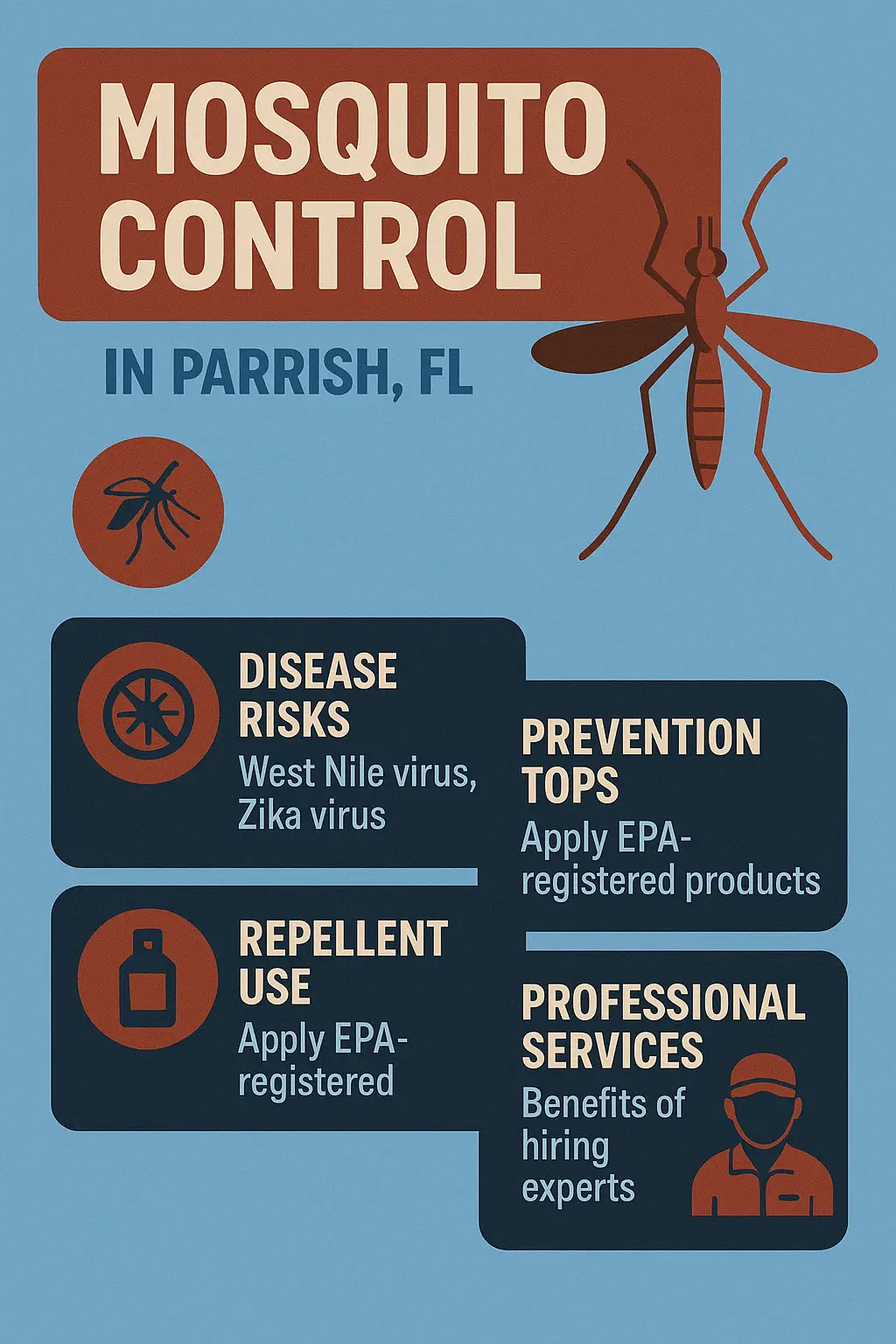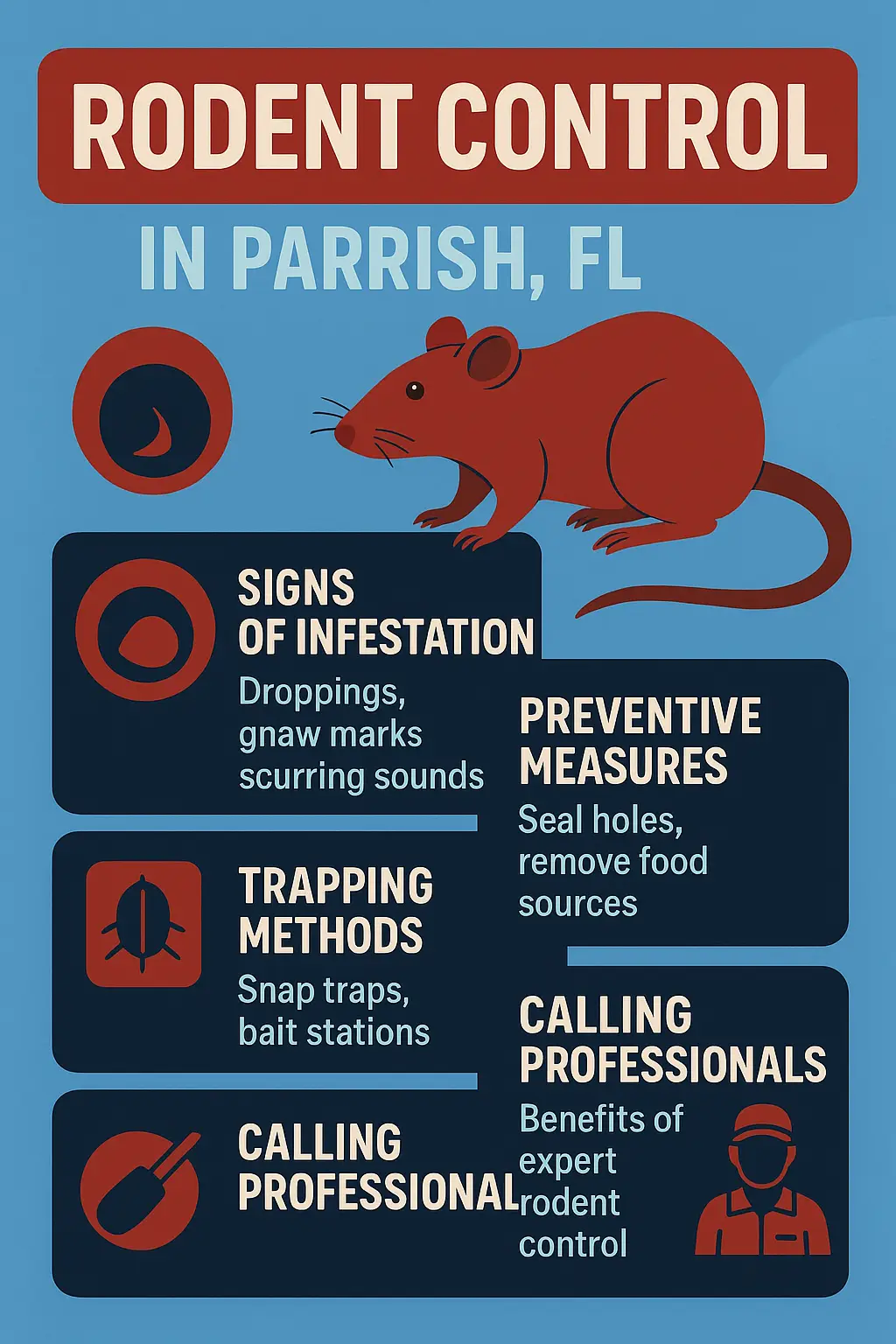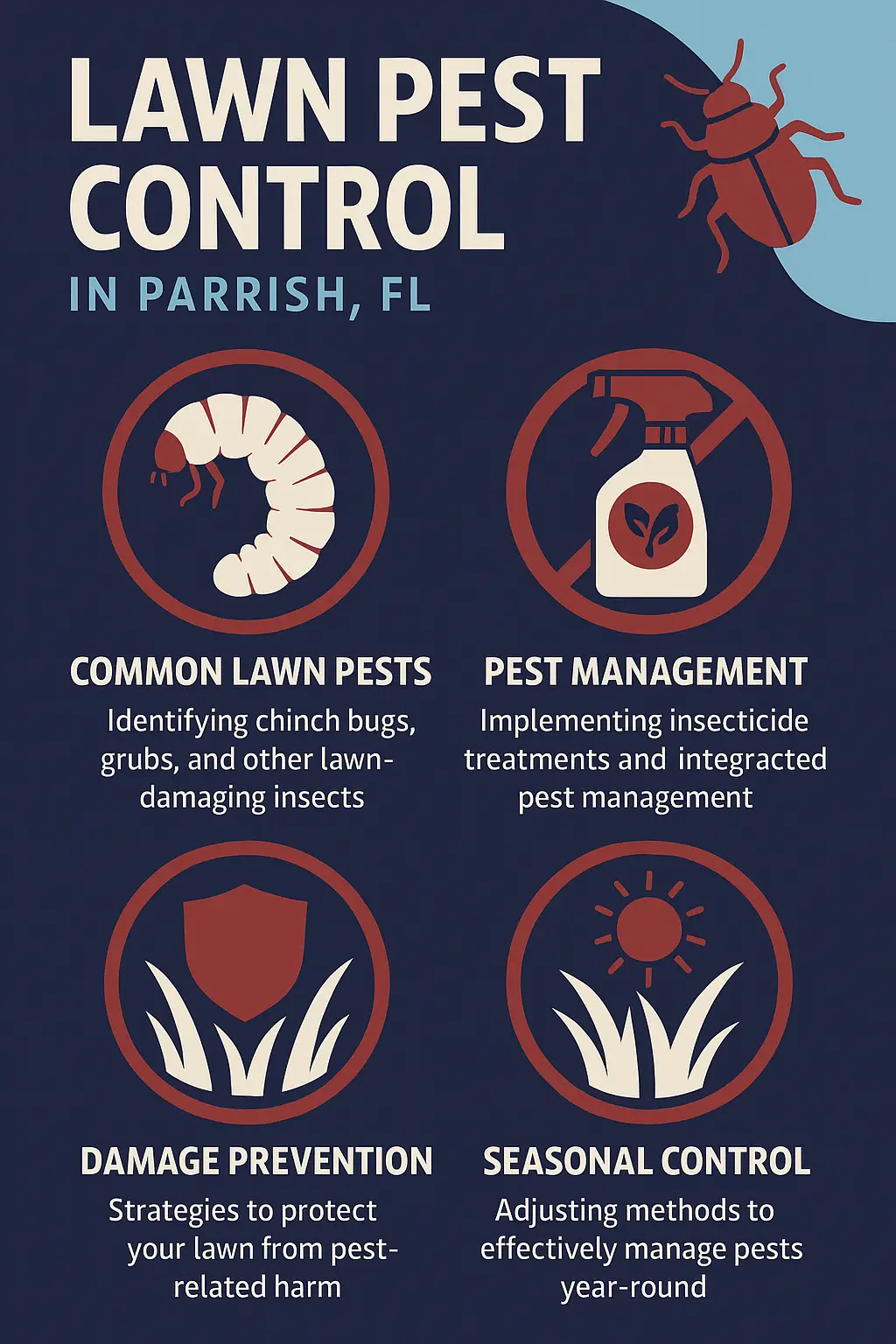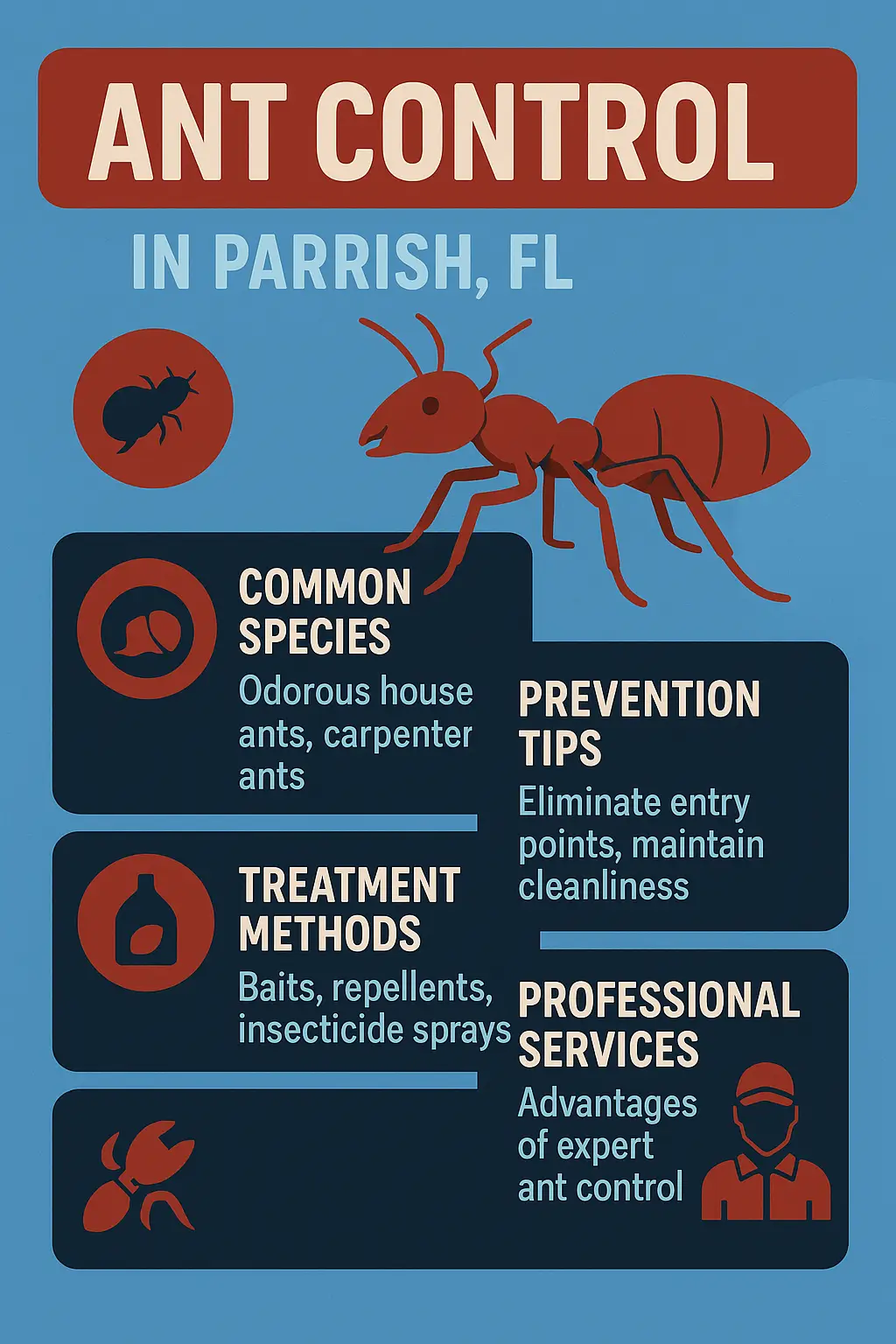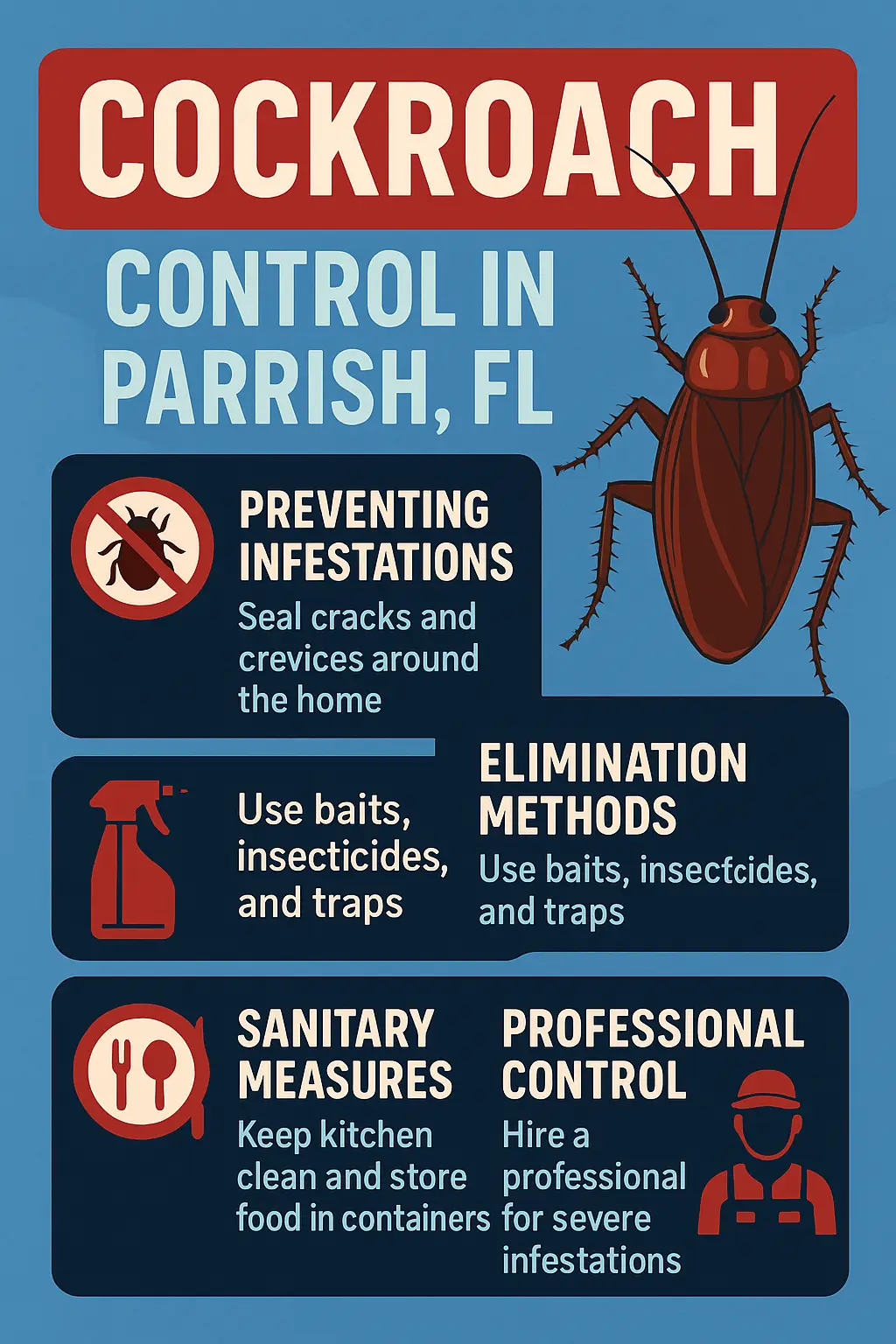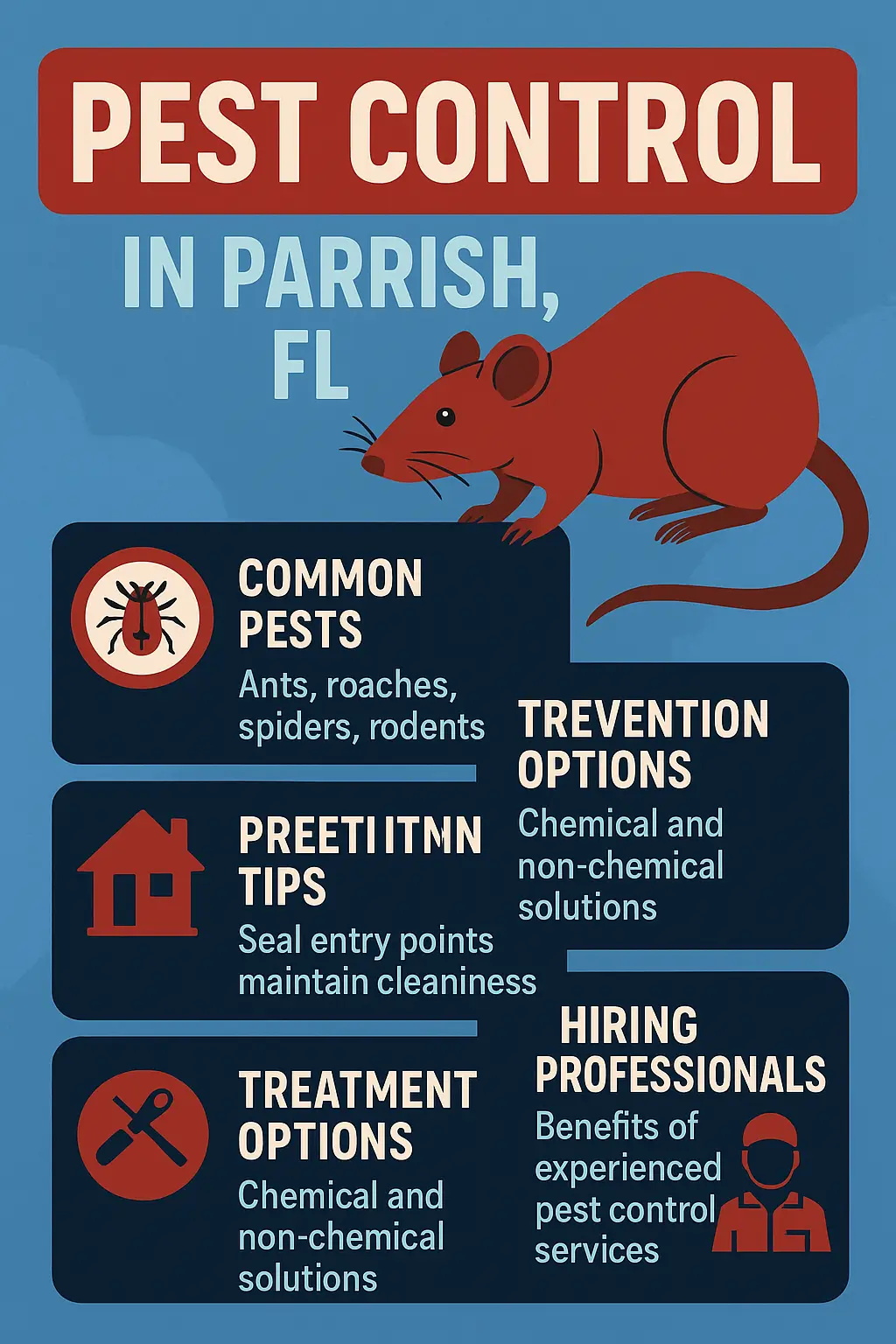Battling pests and tired of searching for “pest control near me”? Your solution is right here with expert pest control in Parrish, FL. We make finding a trustworthy team effortless so you can protect your home
At Waves Pest Control, we specialize in eliminating infestations with precision, using proven techniques that target pests at the source. Whether it’s ants in the kitchen, roaches in the garage, or rodents nesting in hidden spaces, our team is prepared with solutions that deliver real results.
Reliable Pest Protection for Every Season in Parrish
Pests in Florida thrive year-round, which means staying ahead of them requires consistent, professional intervention. In Parrish, warm temperatures and high humidity create the perfect breeding ground for insects, rodents, and other unwelcome invaders. That’s why we take a proactive approach, adjusting our treatments seasonally to combat shifting pest behaviors.
Our services include:
- Comprehensive pest inspections: Identifying potential entry points and infestation risks.
- Custom treatment plans: Designed for the specific pests affecting your property.
- Eco-friendly & family-safe options: Protecting your home without harsh chemicals.
- 100% guaranteed results: Keeping pests out long after they’re gone.
If you’ve been searching for pest control that doesn’t just treat the symptoms but provides lasting relief, our team is ready to step in.
Local Experts, Personalized Solutions
Choosing a pest control service isn’t just about getting rid of pests—it’s about working with professionals who understand the specific challenges that come with living in Parrish. Our team has extensive knowledge of local pest behaviors, seasonal activity patterns, and the most effective extermination methods. We don’t just treat problems; we prevent them from coming back.
Whether you need an urgent extermination or a long-term pest management plan, we’re committed to fast response times, expert care, and guaranteed results.
Call For Local Pest Control in Parrish Today!
Your home should be a place of comfort, not a battleground against pests. Take control with a team that prioritizes your safety and peace of mind. Call (941) 297-2817 today for a free consultation and let Waves Pest Control create a customized plan that keeps your home protected all year long.
Trustindex verifies that the original source of the review is Google. I had a major bee swarm in my garage . I called Waves and within 30 minutes Adam came to the rescue. He got rid of all of them ! He is very knowledgeable and found the root of the issue and will be back as to make sure they do not swarm my home again. I highly recommend this company and will be using them for all my future pest control /maintenance needs.
Owner's reply
It was our pleasure helping you with your bee control situation. We look forward to a continuing, successful pest control partnership. Thanks Anna!Trustindex verifies that the original source of the review is Google. Adam provided wonderful service on pest removal from my property. Clear and open communication, timely, and prompt to his scheduled appointments. Thank you Adam!
Owner's reply
Thank you Doreen, it was a pleasure to help you with your rodent control ans exclusion. Good luck with your move and enjoy South Florida!Trustindex verifies that the original source of the review is Google. Best rodent control service in Bradenton! Adam and the team caught 4 rats. They were professional and reliable, showing up right on time to exterminate the rats. 5 star!
Owner's reply
Thank you, Marilyn! We're thrilled to provide you with top-notch rodent control. Your satisfaction means so much to us!Trustindex verifies that the original source of the review is Google. Adam is an awesome guy who really cares about delivering the absolute best experience for his clients. I strongly recommend reaching out to his team. Honest group of people you can trust in your home or business.
Owner's reply
Thanks, Kevin! We're thrilled to hear you had a great pest control experience. Trustworthy pest control is our top priority!Trustindex verifies that the original source of the review is Google. Professional, knowledgeable and solution oriented. Adam was quick to address our issue and explain our options, highly recommend.
Owner's reply
Thank you, Pete! We're so happy to have helped you with your bee control issues. Your recommendation means the world to us!Trustindex verifies that the original source of the review is Google. We like the new spider 🕷 treatment.
Owner's reply
Thanks you Margo! It was a pleasure helping you and Gene with your 🕷️ spider control.Trustindex verifies that the original source of the review is Google. Adam did a fantastic job on our dogs fleas. I would recommen him 100%! Very prompt and kind, and polite. Thank you Adam.
Owner's reply
Thank you, Georgie, it was my pleasure to help you and Glen with your Flea Treatment in Bradenton. Safe travels!Trustindex verifies that the original source of the review is Google. Nosotros estamos usando los servicios de este grupo para fumigar y para las hormigas y es la primera vez en cuatro años que podemos disfrutar de nuestra propiedad sin ser espantados por los mosquitos y las hormigas, estamos felices con sus servicios
Owner's reply
Thank you, Magdalena! We're thrilled to hear our pest control services helped you enjoy your property without worries. Cheers to a pest-free space!Trustindex verifies that the original source of the review is Google. Best pest control, we have a lake and a large lot. Waves pest control has taken care of our mosquito and ant problem, Adam and the waves team has taken care of them!
Owner's reply
Thank you, Gloria! We're thrilled to hear Waves Pest Control effectively tackled your mosquito and ant issues. Your satisfaction means the world!Trustindex verifies that the original source of the review is Google. Awesome. Reliable. On Time Courteous. Best service ever Adam continues to provide service of excellence. Appreciate his work ethic and concern for my well being.
Owner's reply
Thank you, Brenda! We're thrilled you found our pest control services awesome and reliable. Your support means the world to us!
WaveGuard
Bronze
Quarterly Pest Control Service
-
Priority scheduling, unlimited callbacks, 24-hour response
WaveGuard
Platinum
WaveGuard Bronze + 3 services
-
Pick from Lawn, Mosquito, Rodent or Termite protection
Trustindex verifies that the original source of the review is Google. I had a major bee swarm in my garage . I called Waves and within 30 minutes Adam came to the rescue. He got rid of all of them ! He is very knowledgeable and found the root of the issue and will be back as to make sure they do not swarm my home again. I highly recommend this company and will be using them for all my future pest control /maintenance needs.
Owner's reply
It was our pleasure helping you with your bee control situation. We look forward to a continuing, successful pest control partnership. Thanks Anna!Trustindex verifies that the original source of the review is Google. Adam provided wonderful service on pest removal from my property. Clear and open communication, timely, and prompt to his scheduled appointments. Thank you Adam!
Owner's reply
Thank you Doreen, it was a pleasure to help you with your rodent control ans exclusion. Good luck with your move and enjoy South Florida!Trustindex verifies that the original source of the review is Google. Best rodent control service in Bradenton! Adam and the team caught 4 rats. They were professional and reliable, showing up right on time to exterminate the rats. 5 star!
Owner's reply
Thank you, Marilyn! We're thrilled to provide you with top-notch rodent control. Your satisfaction means so much to us!Trustindex verifies that the original source of the review is Google. Adam is an awesome guy who really cares about delivering the absolute best experience for his clients. I strongly recommend reaching out to his team. Honest group of people you can trust in your home or business.
Owner's reply
Thanks, Kevin! We're thrilled to hear you had a great pest control experience. Trustworthy pest control is our top priority!Trustindex verifies that the original source of the review is Google. Professional, knowledgeable and solution oriented. Adam was quick to address our issue and explain our options, highly recommend.
Owner's reply
Thank you, Pete! We're so happy to have helped you with your bee control issues. Your recommendation means the world to us!Trustindex verifies that the original source of the review is Google. We like the new spider 🕷 treatment.
Owner's reply
Thanks you Margo! It was a pleasure helping you and Gene with your 🕷️ spider control.Trustindex verifies that the original source of the review is Google. Adam did a fantastic job on our dogs fleas. I would recommen him 100%! Very prompt and kind, and polite. Thank you Adam.
Owner's reply
Thank you, Georgie, it was my pleasure to help you and Glen with your Flea Treatment in Bradenton. Safe travels!Trustindex verifies that the original source of the review is Google. Nosotros estamos usando los servicios de este grupo para fumigar y para las hormigas y es la primera vez en cuatro años que podemos disfrutar de nuestra propiedad sin ser espantados por los mosquitos y las hormigas, estamos felices con sus servicios
Owner's reply
Thank you, Magdalena! We're thrilled to hear our pest control services helped you enjoy your property without worries. Cheers to a pest-free space!Trustindex verifies that the original source of the review is Google. Best pest control, we have a lake and a large lot. Waves pest control has taken care of our mosquito and ant problem, Adam and the waves team has taken care of them!
Owner's reply
Thank you, Gloria! We're thrilled to hear Waves Pest Control effectively tackled your mosquito and ant issues. Your satisfaction means the world!Trustindex verifies that the original source of the review is Google. Awesome. Reliable. On Time Courteous. Best service ever Adam continues to provide service of excellence. Appreciate his work ethic and concern for my well being.
Owner's reply
Thank you, Brenda! We're thrilled you found our pest control services awesome and reliable. Your support means the world to us!
Trustindex verifies that the original source of the review is Google. I had a major bee swarm in my garage . I called Waves and within 30 minutes Adam came to the rescue. He got rid of all of them ! He is very knowledgeable and found the root of the issue and will be back as to make sure they do not swarm my home again. I highly recommend this company and will be using them for all my future pest control /maintenance needs.
Owner's reply
It was our pleasure helping you with your bee control situation. We look forward to a continuing, successful pest control partnership. Thanks Anna!Trustindex verifies that the original source of the review is Google. Adam provided wonderful service on pest removal from my property. Clear and open communication, timely, and prompt to his scheduled appointments. Thank you Adam!
Owner's reply
Thank you Doreen, it was a pleasure to help you with your rodent control ans exclusion. Good luck with your move and enjoy South Florida!Trustindex verifies that the original source of the review is Google. Best rodent control service in Bradenton! Adam and the team caught 4 rats. They were professional and reliable, showing up right on time to exterminate the rats. 5 star!
Owner's reply
Thank you, Marilyn! We're thrilled to provide you with top-notch rodent control. Your satisfaction means so much to us!Trustindex verifies that the original source of the review is Google. Adam is an awesome guy who really cares about delivering the absolute best experience for his clients. I strongly recommend reaching out to his team. Honest group of people you can trust in your home or business.
Owner's reply
Thanks, Kevin! We're thrilled to hear you had a great pest control experience. Trustworthy pest control is our top priority!Trustindex verifies that the original source of the review is Google. Professional, knowledgeable and solution oriented. Adam was quick to address our issue and explain our options, highly recommend.
Owner's reply
Thank you, Pete! We're so happy to have helped you with your bee control issues. Your recommendation means the world to us!Trustindex verifies that the original source of the review is Google. We like the new spider 🕷 treatment.
Owner's reply
Thanks you Margo! It was a pleasure helping you and Gene with your 🕷️ spider control.Trustindex verifies that the original source of the review is Google. Adam did a fantastic job on our dogs fleas. I would recommen him 100%! Very prompt and kind, and polite. Thank you Adam.
Owner's reply
Thank you, Georgie, it was my pleasure to help you and Glen with your Flea Treatment in Bradenton. Safe travels!Trustindex verifies that the original source of the review is Google. Nosotros estamos usando los servicios de este grupo para fumigar y para las hormigas y es la primera vez en cuatro años que podemos disfrutar de nuestra propiedad sin ser espantados por los mosquitos y las hormigas, estamos felices con sus servicios
Owner's reply
Thank you, Magdalena! We're thrilled to hear our pest control services helped you enjoy your property without worries. Cheers to a pest-free space!Trustindex verifies that the original source of the review is Google. Best pest control, we have a lake and a large lot. Waves pest control has taken care of our mosquito and ant problem, Adam and the waves team has taken care of them!
Owner's reply
Thank you, Gloria! We're thrilled to hear Waves Pest Control effectively tackled your mosquito and ant issues. Your satisfaction means the world!Trustindex verifies that the original source of the review is Google. Awesome. Reliable. On Time Courteous. Best service ever Adam continues to provide service of excellence. Appreciate his work ethic and concern for my well being.
Owner's reply
Thank you, Brenda! We're thrilled you found our pest control services awesome and reliable. Your support means the world to us!
Termite control in Parrish, FL is essential if you want to avoid major structural repairs and costly surprises. Termites are active year-round in our warm, humid climate, and they don’t need much to start causing serious damage inside your walls, floors, or attic.
If you’ve noticed bubbling paint, mud tubes near the foundation, or soft wood around windows and baseboards, it’s a smart time to schedule a termite inspection.
Termites in the House? Here’s What to Know
It doesn’t take a full swarm to cause problems. Even a small colony can chew through wood silently for months. Look for:
Discarded wings on windowsills
Wood that sounds hollow when tapped
Small piles of what looks like sawdust near walls or trim
Swollen floors or areas that resemble water damage
Once termites are in the house, fast, effective termite treatment is the best way to stop the spread and avoid long-term issues.
How Termite Treatment Works
The right solution depends on how early the problem is caught and the layout of your home. Most professional plans include:
A full inspection to locate termite activity and risk zones
Liquid barrier applications or bait station systems
Localized or whole-home treatments as needed
Optional monitoring and preventive strategies
If you’ve been pricing out the termite treatment cost, keep in mind that catching it early means lower risk and less repair work later. The termite treatment price varies based on the type of treatment, home size, and severity of the infestation.
Termite Exterminator Cost vs. The Cost of Waiting
Many homeowners ask about termite exterminator cost before scheduling service, and that’s a fair question. But the bigger expense usually comes from waiting too long. Repairs to damaged studs, flooring, and framing can quickly exceed the cost of a professional termite job—especially if you’re preparing to sell or refinance.
Getting treatment now helps protect your property value and your wallet.
Schedule Termite Control in Parrish, FL! Call Now!
Don’t give termites more time to spread. Call (941) 297-2817 to schedule expert termite control in Parrish, FL. Local knowledge. Trusted treatment. Real protection where it counts.
Bed bug control in Parrish, FL is something no homeowner wants to think about—but it becomes urgent fast once the signs start showing. These pests are small, silent, and excellent at hiding in mattresses, furniture, and baseboards. By the time you see the bites, they’ve already settled in.
If you’re waking up itchy or spotting tiny dark stains on your sheets, it’s time to act.
Signs You May Need a Bed Bug Exterminator
Bed bugs are often mistaken for other pests, but they leave a few clear clues behind:
Small, red bites in rows or clusters
Rust-colored stains or black specks on bedding or furniture
A musty odor in bedrooms or closets
Live bugs in mattress seams or furniture cracks
A local bed bug exterminator can confirm the issue and help you move quickly before it spreads to other rooms.
What to Expect from Bed Bug Treatment
Effective bed bug treatment requires more than a quick spray. A professional plan typically includes:
A full inspection of beds, furniture, and wall gaps
Safe, targeted treatment options—including bed bug heat treatment
Follow-up visits if needed for severe or recurring issues
Whether you’re dealing with a light infestation or something more advanced, experienced bed bug pest control targets the bugs, their eggs, and their hiding spots for total relief.
What’s the Bed Bug Removal Cost?
The bed bug removal cost depends on how early the problem is caught, how many rooms are affected, and the type of treatment used. The average bed bugs treatment cost can vary, but choosing a trusted bed bug company can save you from drawn-out, repeated treatments that don’t fully solve the problem.
If you’re comparing bed bug control services, look for experience, fast scheduling, and modern treatment methods that actually work.
Schedule Bed Bug Control in Parrish, FL! Call Today!
Don’t let bed bugs take over your home—or your sleep. Call (941) 297-2817 today to schedule expert bed bug control in Parrish, FL. Quick answers, proven results, and real peace of mind.
Trustindex verifies that the original source of the review is Google. I had a major bee swarm in my garage . I called Waves and within 30 minutes Adam came to the rescue. He got rid of all of them ! He is very knowledgeable and found the root of the issue and will be back as to make sure they do not swarm my home again. I highly recommend this company and will be using them for all my future pest control /maintenance needs.
Owner's reply
It was our pleasure helping you with your bee control situation. We look forward to a continuing, successful pest control partnership. Thanks Anna!Trustindex verifies that the original source of the review is Google. Adam provided wonderful service on pest removal from my property. Clear and open communication, timely, and prompt to his scheduled appointments. Thank you Adam!
Owner's reply
Thank you Doreen, it was a pleasure to help you with your rodent control ans exclusion. Good luck with your move and enjoy South Florida!Trustindex verifies that the original source of the review is Google. Best rodent control service in Bradenton! Adam and the team caught 4 rats. They were professional and reliable, showing up right on time to exterminate the rats. 5 star!
Owner's reply
Thank you, Marilyn! We're thrilled to provide you with top-notch rodent control. Your satisfaction means so much to us!Trustindex verifies that the original source of the review is Google. Adam is an awesome guy who really cares about delivering the absolute best experience for his clients. I strongly recommend reaching out to his team. Honest group of people you can trust in your home or business.
Owner's reply
Thanks, Kevin! We're thrilled to hear you had a great pest control experience. Trustworthy pest control is our top priority!Trustindex verifies that the original source of the review is Google. Professional, knowledgeable and solution oriented. Adam was quick to address our issue and explain our options, highly recommend.
Owner's reply
Thank you, Pete! We're so happy to have helped you with your bee control issues. Your recommendation means the world to us!Trustindex verifies that the original source of the review is Google. We like the new spider 🕷 treatment.
Owner's reply
Thanks you Margo! It was a pleasure helping you and Gene with your 🕷️ spider control.Trustindex verifies that the original source of the review is Google. Adam did a fantastic job on our dogs fleas. I would recommen him 100%! Very prompt and kind, and polite. Thank you Adam.
Owner's reply
Thank you, Georgie, it was my pleasure to help you and Glen with your Flea Treatment in Bradenton. Safe travels!Trustindex verifies that the original source of the review is Google. Nosotros estamos usando los servicios de este grupo para fumigar y para las hormigas y es la primera vez en cuatro años que podemos disfrutar de nuestra propiedad sin ser espantados por los mosquitos y las hormigas, estamos felices con sus servicios
Owner's reply
Thank you, Magdalena! We're thrilled to hear our pest control services helped you enjoy your property without worries. Cheers to a pest-free space!Trustindex verifies that the original source of the review is Google. Best pest control, we have a lake and a large lot. Waves pest control has taken care of our mosquito and ant problem, Adam and the waves team has taken care of them!
Owner's reply
Thank you, Gloria! We're thrilled to hear Waves Pest Control effectively tackled your mosquito and ant issues. Your satisfaction means the world!Trustindex verifies that the original source of the review is Google. Awesome. Reliable. On Time Courteous. Best service ever Adam continues to provide service of excellence. Appreciate his work ethic and concern for my well being.
Owner's reply
Thank you, Brenda! We're thrilled you found our pest control services awesome and reliable. Your support means the world to us!
Mosquito control in Parrish, FL is essential if you want to actually enjoy your outdoor space. Mosquitoes thrive in our warm, humid environment—and without proper treatment, they’ll quickly take over your yard, driveway, and patio.
From afternoon barbecues to quiet mornings on the porch, nothing ruins the mood faster than clouds of biting insects.
Why Mosquito Control for Your Yard Matters
It only takes a few small pools of standing water to start a mosquito problem. Clogged gutters, damp mulch, and even planter trays can become breeding spots. That’s why mosquito control for yard areas needs more than just a one-time spray.
Professionals offering mosquito lawn treatment and full-service mosquito pest control focus on both active infestations and prevention strategies to keep them away.
What Mosquito Services Typically Include
A trusted mosquito service will start with an inspection and build a plan that may involve:
Spot-treating shrubs, grass lines, and shaded areas
Applying barrier sprays to reduce mosquito activity
Offering optional mosquito and tick control add-ons
Creating long-term maintenance schedules during peak season
If you’ve been searching for “mosquito control backyard” help or comparing mosquito control companies, going local makes a big difference—especially in areas like Parrish where seasonal mosquito pressure can be intense.
Looking for the Best Mosquito Control?
The best mosquito control isn’t about foggers or store-bought sprays—it’s about consistent, targeted applications that actually stop the breeding cycle. Whether you need a one-time visit or regular service, reliable mosquito control services keep your yard comfortable all year long.
If your lawn feels more like a bug buffet, lawn mosquito control can be added to your regular yard maintenance plan for maximum impact.
Schedule Mosquito Control in Parrish, FL! Call Now!
Don’t let mosquitoes ruin your time outside. Call (941) 297-2817 today to schedule expert mosquito control in Parrish, FL. Trusted service, local know-how, and real relief from biting pests.
Rodent control in Parrish, FL is more than a convenience—it’s a necessity if you’re noticing signs of rats or mice in your home. Whether it’s scratching in the walls, chewed wires, or droppings in drawers, rodents bring more than noise—they bring health risks and expensive damage.
The sooner you act, the easier it is to stop the infestation before it spreads.
Signs You Need a Rodent Exterminator
Rodents are experts at hiding, but they leave clues behind. You might notice:
Gnaw marks on food packages or baseboards
Nesting materials like shredded paper or insulation
Odd odors or unexplained pet behavior
Droppings in attics, garages, or cabinets
At that point, calling a professional rodent exterminator is the best next step. DIY traps often fall short—especially if there’s a nest hidden behind your walls.
What Rodent Pest Control Includes
An experienced technician will start by inspecting your home, identifying entry points, and creating a custom treatment plan. A thorough rodent pest control service typically includes:
Safe, effective removal of active rodents
Sealing of common access areas (vents, pipes, gaps, etc.)
Recommendations for prevention and long-term monitoring
If you’re looking for full coverage, pest and rodent control services can address other household pests at the same time—ideal for Florida homes that face multiple challenges throughout the year.
What Does Rodent Exterminator Cost?
The rodent exterminator cost depends on the severity of the infestation and the size of your property. Some homes may need just a one-time service, while others benefit from seasonal or recurring rodent control services for full prevention.
In either case, addressing the issue early is always more affordable than waiting until insulation, drywall, or wiring needs repair.
Book Rodent Removal in Parrish, FL! Call Today!
If you’re ready for safe, effective rodent removal without the stress, we’re here to help. Call (941) 297-2817 now to schedule expert rodent control in Parrish, FL. Stop the damage. Start fresh. Stay protected.
Trustindex verifies that the original source of the review is Google. I had a major bee swarm in my garage . I called Waves and within 30 minutes Adam came to the rescue. He got rid of all of them ! He is very knowledgeable and found the root of the issue and will be back as to make sure they do not swarm my home again. I highly recommend this company and will be using them for all my future pest control /maintenance needs.
Owner's reply
It was our pleasure helping you with your bee control situation. We look forward to a continuing, successful pest control partnership. Thanks Anna!Trustindex verifies that the original source of the review is Google. Adam provided wonderful service on pest removal from my property. Clear and open communication, timely, and prompt to his scheduled appointments. Thank you Adam!
Owner's reply
Thank you Doreen, it was a pleasure to help you with your rodent control ans exclusion. Good luck with your move and enjoy South Florida!Trustindex verifies that the original source of the review is Google. Best rodent control service in Bradenton! Adam and the team caught 4 rats. They were professional and reliable, showing up right on time to exterminate the rats. 5 star!
Owner's reply
Thank you, Marilyn! We're thrilled to provide you with top-notch rodent control. Your satisfaction means so much to us!Trustindex verifies that the original source of the review is Google. Adam is an awesome guy who really cares about delivering the absolute best experience for his clients. I strongly recommend reaching out to his team. Honest group of people you can trust in your home or business.
Owner's reply
Thanks, Kevin! We're thrilled to hear you had a great pest control experience. Trustworthy pest control is our top priority!Trustindex verifies that the original source of the review is Google. Professional, knowledgeable and solution oriented. Adam was quick to address our issue and explain our options, highly recommend.
Owner's reply
Thank you, Pete! We're so happy to have helped you with your bee control issues. Your recommendation means the world to us!Trustindex verifies that the original source of the review is Google. We like the new spider 🕷 treatment.
Owner's reply
Thanks you Margo! It was a pleasure helping you and Gene with your 🕷️ spider control.Trustindex verifies that the original source of the review is Google. Adam did a fantastic job on our dogs fleas. I would recommen him 100%! Very prompt and kind, and polite. Thank you Adam.
Owner's reply
Thank you, Georgie, it was my pleasure to help you and Glen with your Flea Treatment in Bradenton. Safe travels!Trustindex verifies that the original source of the review is Google. Nosotros estamos usando los servicios de este grupo para fumigar y para las hormigas y es la primera vez en cuatro años que podemos disfrutar de nuestra propiedad sin ser espantados por los mosquitos y las hormigas, estamos felices con sus servicios
Owner's reply
Thank you, Magdalena! We're thrilled to hear our pest control services helped you enjoy your property without worries. Cheers to a pest-free space!Trustindex verifies that the original source of the review is Google. Best pest control, we have a lake and a large lot. Waves pest control has taken care of our mosquito and ant problem, Adam and the waves team has taken care of them!
Owner's reply
Thank you, Gloria! We're thrilled to hear Waves Pest Control effectively tackled your mosquito and ant issues. Your satisfaction means the world!Trustindex verifies that the original source of the review is Google. Awesome. Reliable. On Time Courteous. Best service ever Adam continues to provide service of excellence. Appreciate his work ethic and concern for my well being.
Owner's reply
Thank you, Brenda! We're thrilled you found our pest control services awesome and reliable. Your support means the world to us!
Lawn pest control in Parrish, FL is about more than just having a green yard—it’s about making sure your outdoor space is safe and enjoyable for your family, pets, and guests. From fleas and ticks to mosquitoes and grubs, Florida lawns are full of tiny threats that can turn your backyard into a bite zone fast.
If your yard looks fine but feels like a bug trap, it’s time for targeted treatment.
What’s Bugging Your Lawn?
In Florida’s warm, humid conditions, several pests thrive under the surface and in the grass, including:
Fleas and ticks nesting in shaded, moist areas
Mosquitoes breeding near mulch beds and water features
Grubs destroying roots from underneath
Professional lawn insect control handles all of these threats, often before you even see the damage.
Lawn Pest Solutions That Work
Whether you’re seeing patches of brown grass or itchy bites after walking through the yard, a good yard pest control plan can help. Local providers often combine:
Grub control for lawn and proactive lawn grub treatment
Seasonal mosquito lawn treatment and lawn mosquito control
For families with pets or kids playing outside, flea and tick yard treatment is especially important—and so is ongoing tick prevention for yard.
Looking for the Best Lawn Pest Control Near You?
If you’ve been searching for “lawn pest control near me” or “lawn insect control near me,” you’re not alone. Homeowners across Parrish are turning to local experts for consistent, affordable care that’s tailored to our climate.
Whether you’re dealing with one pest or a mix of them, companies that offer full-service programs—sometimes referred to as solution pest and lawn services—can deliver layered protection that lasts.
Schedule Lawn Pest Control in Parrish, FL! Call Now!
Stop letting bugs rule your yard. Call (941) 297-2817 now to book trusted lawn pest control in Parrish, FL. From mosquito treatment for yard to the best flea treatment for yard, we’ve got your lawn covered—so you can enjoy it again.
If you’re seeing ant trails inside or discovering mounds around your yard, now’s the time for professional ant control in Parrish, FL. Ants are more than a nuisance—they can contaminate food, damage structures, and even pose a risk to pets and kids. Without expert ant pest control, they’ll only get worse over time.
Signs It’s Time for Ant Removal
Ant infestations often start small but grow fast. Common signs include:
Lines of ants along baseboards, walls, or countertops
Sawdust piles or crumbling wood indicating carpenter ants
Large, aggressive mounds from fire ants
Ants returning shortly after DIY treatments
If any of these are happening, a professional ant removal service will quickly identify and eliminate the problem.
What Professional Ant Treatment Involves
Customized ant treatment typically includes:
Precise ant treatment for house interiors to stop indoor infestations
Thorough ant treatment for yard to eliminate outdoor colonies
Baiting systems, barrier sprays, and nest targeting
Recommendations for sealing entry points and minimizing attractants
When dealing with larger colonies or hidden nests, specialized carpenter ant control becomes essential.
Specialized Carpenter Ant & Fire Ant Control
Carpenter ant extermination targets colonies inside walls, attics, or woodwork.
Carpenter ant treatment may involve multiple steps, including baiting and direct application.
Carpenter ant removal protects your home from long-term structural damage.
Carpenter ant treatment cost varies depending on how deep the infestation has gone.
Fire ant control focuses on quickly eliminating visible and hidden mounds.
Fire ant treatment often involves yard-wide baiting for thorough eradication.
How Much Does Ant Extermination Cost?
Homeowners in Parrish often ask about:
The difference between standard and carpenter ant treatment cost
The final price depends on property size, infestation type, and whether treatment needs to focus inside, outside, or both. After a complete inspection, you’ll receive an honest, customized quote.
Call For Pro Ant Control in Parrish, FL Now!
Don’t let ants take over your home or lawn. Call (941) 297-2817 today to schedule expert ant control services in Parrish, FL. Fast inspections, proven treatments, and lasting results—so you can enjoy your home and yard without worrying about ants coming back.
Trustindex verifies that the original source of the review is Google. I had a major bee swarm in my garage . I called Waves and within 30 minutes Adam came to the rescue. He got rid of all of them ! He is very knowledgeable and found the root of the issue and will be back as to make sure they do not swarm my home again. I highly recommend this company and will be using them for all my future pest control /maintenance needs.
Owner's reply
It was our pleasure helping you with your bee control situation. We look forward to a continuing, successful pest control partnership. Thanks Anna!Trustindex verifies that the original source of the review is Google. Adam provided wonderful service on pest removal from my property. Clear and open communication, timely, and prompt to his scheduled appointments. Thank you Adam!
Owner's reply
Thank you Doreen, it was a pleasure to help you with your rodent control ans exclusion. Good luck with your move and enjoy South Florida!Trustindex verifies that the original source of the review is Google. Best rodent control service in Bradenton! Adam and the team caught 4 rats. They were professional and reliable, showing up right on time to exterminate the rats. 5 star!
Owner's reply
Thank you, Marilyn! We're thrilled to provide you with top-notch rodent control. Your satisfaction means so much to us!Trustindex verifies that the original source of the review is Google. Adam is an awesome guy who really cares about delivering the absolute best experience for his clients. I strongly recommend reaching out to his team. Honest group of people you can trust in your home or business.
Owner's reply
Thanks, Kevin! We're thrilled to hear you had a great pest control experience. Trustworthy pest control is our top priority!Trustindex verifies that the original source of the review is Google. Professional, knowledgeable and solution oriented. Adam was quick to address our issue and explain our options, highly recommend.
Owner's reply
Thank you, Pete! We're so happy to have helped you with your bee control issues. Your recommendation means the world to us!Trustindex verifies that the original source of the review is Google. We like the new spider 🕷 treatment.
Owner's reply
Thanks you Margo! It was a pleasure helping you and Gene with your 🕷️ spider control.Trustindex verifies that the original source of the review is Google. Adam did a fantastic job on our dogs fleas. I would recommen him 100%! Very prompt and kind, and polite. Thank you Adam.
Owner's reply
Thank you, Georgie, it was my pleasure to help you and Glen with your Flea Treatment in Bradenton. Safe travels!Trustindex verifies that the original source of the review is Google. Nosotros estamos usando los servicios de este grupo para fumigar y para las hormigas y es la primera vez en cuatro años que podemos disfrutar de nuestra propiedad sin ser espantados por los mosquitos y las hormigas, estamos felices con sus servicios
Owner's reply
Thank you, Magdalena! We're thrilled to hear our pest control services helped you enjoy your property without worries. Cheers to a pest-free space!Trustindex verifies that the original source of the review is Google. Best pest control, we have a lake and a large lot. Waves pest control has taken care of our mosquito and ant problem, Adam and the waves team has taken care of them!
Owner's reply
Thank you, Gloria! We're thrilled to hear Waves Pest Control effectively tackled your mosquito and ant issues. Your satisfaction means the world!Trustindex verifies that the original source of the review is Google. Awesome. Reliable. On Time Courteous. Best service ever Adam continues to provide service of excellence. Appreciate his work ethic and concern for my well being.
Owner's reply
Thank you, Brenda! We're thrilled you found our pest control services awesome and reliable. Your support means the world to us!
Seeing even one roach in your home can be a warning sign of a much bigger problem. If you’re searching for fast, reliable cockroach control in Parrish, FL, now’s the time to act. Roaches multiply quickly, spread germs, and can trigger allergies—making professional roach pest control essential.
Signs You Need Roach Control
Roaches are experts at hiding, but they always leave signs behind:
Droppings that look like coffee grounds or black pepper
Discarded wings or egg casings behind appliances and furniture
A strong, musty odor in closed-off areas
Live sightings—especially during the day, which often signals a large infestation
If you’re seeing these signs, it’s time to bring in the best exterminator for roaches before things get worse.
What Professional Roach Treatment Includes
Effective roach treatment isn’t about quick sprays—it’s about elimination at the colony level. A full service typically involves:
Baiting and gel placements in hidden areas
Perimeter roach control to stop new roaches from entering
Targeted crack-and-crevice applications for lasting results
Sanitation tips to help keep your home roach-free
For stubborn infestations, especially involving fast-breeding German roaches, specialized german roach treatment is necessary to fully break the cycle.
Why Choose Expert Roach Extermination?
The best pest control for roaches focuses on the root of the problem—not just the symptoms. A professional roach exterminator can locate nests, treat the areas you can’t see, and put long-term prevention strategies in place.
When done right, complete roach removal leaves your home healthier, cleaner, and protected for the future.
Call for Cockroach Control in Parrish, FL Now!
Don’t wait for a few roaches to turn into a full infestation. Call (941) 297-2817 today to schedule expert cockroach control services in Parrish, FL. From initial roach pest control to complete roach treatment plans, you’ll get fast, reliable results from a local team you can trust.
Living in Parrish means enjoying beautiful Florida weather—but it also means pests can be a year-round issue. Whether you’re seeing ants, roaches, spiders, or other invaders, professional pest control in Parrish, FL is the smartest way to protect your home and family.
With expert pest management, you’ll not only get rid of pests—you’ll stay ahead of future problems, too.
Why You Need a Professional Exterminator
Pests can hide deep within walls, attics, and foundations. Over-the-counter sprays and traps might slow them down, but only a trained exterminator in Parrish, FL knows how to find and eliminate the source.
Professional pesticide control combines safe, targeted treatments with strategic prevention, offering peace of mind you can’t get from DIY solutions.
What to Expect from Pest Extermination
When you call a trusted pest exterminator in Parrish, FL, you’ll receive:
Detailed inspections to identify active pests and their entry points
Custom indoor and outdoor treatment plans
Family- and pet-safe product options
Ongoing pest management programs for year-round protection
If bugs have already moved in, fast insect removal and precise insect control will get your home back to normal quickly.
Common Pests Treated in Parrish Homes
Ants raiding kitchens and bathrooms
Roaches hiding in garages, pantries, and under sinks
Spiders building webs around windows, attics, and eaves
Occasional invaders like silverfish, millipedes, beetles, and earwigs
With professional service, you won’t just get relief—you’ll get lasting protection.
Call Now For Pest Control in Parrish, FL!
Don’t let pests take over your home or property. Call (941) 297-2817 today to schedule expert pest control services in Parrish, FL. From fast insect removal to complete pesticide control and proactive pest management, we’ll help you enjoy a safer, healthier, pest-free home—year-round.
Trustindex verifies that the original source of the review is Google. I had a major bee swarm in my garage . I called Waves and within 30 minutes Adam came to the rescue. He got rid of all of them ! He is very knowledgeable and found the root of the issue and will be back as to make sure they do not swarm my home again. I highly recommend this company and will be using them for all my future pest control /maintenance needs.
Owner's reply
It was our pleasure helping you with your bee control situation. We look forward to a continuing, successful pest control partnership. Thanks Anna!Trustindex verifies that the original source of the review is Google. Adam provided wonderful service on pest removal from my property. Clear and open communication, timely, and prompt to his scheduled appointments. Thank you Adam!
Owner's reply
Thank you Doreen, it was a pleasure to help you with your rodent control ans exclusion. Good luck with your move and enjoy South Florida!Trustindex verifies that the original source of the review is Google. Best rodent control service in Bradenton! Adam and the team caught 4 rats. They were professional and reliable, showing up right on time to exterminate the rats. 5 star!
Owner's reply
Thank you, Marilyn! We're thrilled to provide you with top-notch rodent control. Your satisfaction means so much to us!Trustindex verifies that the original source of the review is Google. Adam is an awesome guy who really cares about delivering the absolute best experience for his clients. I strongly recommend reaching out to his team. Honest group of people you can trust in your home or business.
Owner's reply
Thanks, Kevin! We're thrilled to hear you had a great pest control experience. Trustworthy pest control is our top priority!Trustindex verifies that the original source of the review is Google. Professional, knowledgeable and solution oriented. Adam was quick to address our issue and explain our options, highly recommend.
Owner's reply
Thank you, Pete! We're so happy to have helped you with your bee control issues. Your recommendation means the world to us!Trustindex verifies that the original source of the review is Google. We like the new spider 🕷 treatment.
Owner's reply
Thanks you Margo! It was a pleasure helping you and Gene with your 🕷️ spider control.Trustindex verifies that the original source of the review is Google. Adam did a fantastic job on our dogs fleas. I would recommen him 100%! Very prompt and kind, and polite. Thank you Adam.
Owner's reply
Thank you, Georgie, it was my pleasure to help you and Glen with your Flea Treatment in Bradenton. Safe travels!Trustindex verifies that the original source of the review is Google. Nosotros estamos usando los servicios de este grupo para fumigar y para las hormigas y es la primera vez en cuatro años que podemos disfrutar de nuestra propiedad sin ser espantados por los mosquitos y las hormigas, estamos felices con sus servicios
Owner's reply
Thank you, Magdalena! We're thrilled to hear our pest control services helped you enjoy your property without worries. Cheers to a pest-free space!Trustindex verifies that the original source of the review is Google. Best pest control, we have a lake and a large lot. Waves pest control has taken care of our mosquito and ant problem, Adam and the waves team has taken care of them!
Owner's reply
Thank you, Gloria! We're thrilled to hear Waves Pest Control effectively tackled your mosquito and ant issues. Your satisfaction means the world!Trustindex verifies that the original source of the review is Google. Awesome. Reliable. On Time Courteous. Best service ever Adam continues to provide service of excellence. Appreciate his work ethic and concern for my well being.
Owner's reply
Thank you, Brenda! We're thrilled you found our pest control services awesome and reliable. Your support means the world to us!
An initial pest control treatment is crucial for eliminating and preventing pests, but in our sub-tropical climate, pest control is a year-round necessity. We use only the highest quality materials, ensuring that each treatment strengthens the protective insect barrier around your home.
Pest control in subtropical regions requires ongoing attention. While initial treatment is crucial for eliminating and deterring pests, maintaining protection demands year-round vigilance. Our quarterly treatments use premium products, progressively strengthening the protective barrier against infestation.
Our initial pest control treatment serves as a flushing procedure to decrease pest activity and draw pests into the open. This enables us to target them more effectively during your follow-up pest control treatment. Please allow 7-10 days after your pest control initial treatment for it to take full effect.
Waves Pest Control offers affordable pest management solutions for local residents. Our pest control cost starts at just $39/month for quarterly services. When looking for “affordable pest control near me” in Parrish, you’ll find our pricing competitive. Our pest control prices include year-round protection with three annual visits, making us a cost-effective choice for Parrish homeowners seeking reliable pest management.
All our pest and lawn care services are safe for pets and children. We exclusively use products that are EPA-approved or EPA-exempt.
In Parrish, Florida, the average cost for professional pest control services typically ranges from $100 to $300 per visit, depending on factors like property size, pest type, and service frequency. Here’s a general breakdown:
Monthly service: Approximately $40–$100
Quarterly service: Typically $100–$300 per visit
One-time treatments: Can start around $250 to $400, depending on the severity of the infestation and the type of pest.
While DIY options might seem cheaper upfront, they often miss hidden infestations — leading to bigger, more expensive problems later. That’s why many homeowners trust Waves Pest Control for affordable, professional pest management starting at just $39/month. With expert care, you’ll save time, avoid frustration, and protect your home the right way the first time.
Some pests are incredibly tough to eliminate without professional help. The most difficult usually include:
Bed Bugs: They hide in tiny crevices and are highly resistant to many common treatments.
German Cockroaches: Rapid breeders that quickly develop resistance to pesticides.
Termites: Silent destroyers that can cause extensive damage long before you notice them.
DIY methods rarely work against these pests long-term. That’s why Waves Pest Control uses professional-grade products, advanced techniques, and customized treatment plans to eliminate even the most stubborn infestations — giving you true peace of mind.
We offer a comprehensive pest control guarantee including unlimited callbacks if pests return, 100% satisfaction with additional pest control treatments if needed, and a response time within 2 hours with on-site service within 24 hours.
When it comes to pest control, quality matters. While several reputable companies operate in Florida, homeowners in Parrish and surrounding areas trust Waves Pest Control for one big reason: local expertise backed by real results.
Fast, friendly service.
Eco-friendly, family-safe solutions.
Customized plans tailored to your home’s unique needs.
Affordable pricing without cutting corners.
Why gamble with nationwide chains when you can work with a local team that truly understands the pests in your backyard?
DIY pest control kits might cost anywhere from $15 to $80, and professional-grade products can cost more. But here’s the truth: unless you’re trained to spot breeding sites, entry points, and pest behavior patterns, DIY efforts often fall short — wasting both time and money.
In many cases, homeowners end up spending hundreds on DIY supplies only to call a professional later when the problem gets worse.
Waves Pest Control eliminates the guesswork with proven treatments that actually work, saving you from costly mistakes and recurring infestations.
For “pest control near me,” rely on Waves Pest Control for expert, tailored services. Our highly trained professionals address local pest challenges with customized pest control treatment plans and preventative measures to keep your property pest-free year-round.



